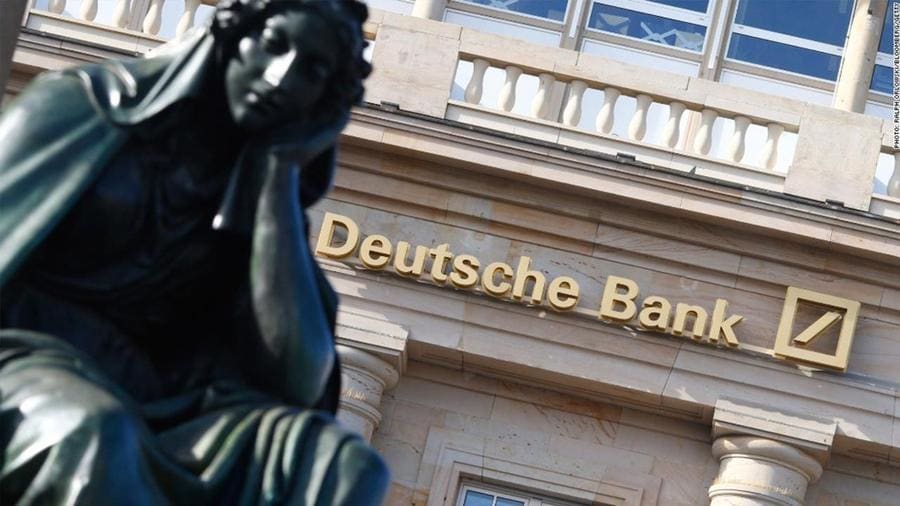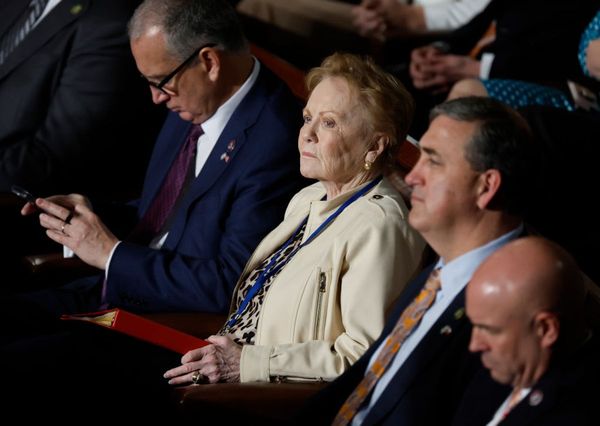
Deutsche Bank (DB) shares slumped lower Friday after contracts designed to insure against any default on its debt surged amid concern that the region's second-largest lender will be pulled into the recent market maelstrom.
Credit-default swaps on Deutsche Bank debt, which allow an investor to pay a regular premium to insure their debt holdings against default, jumped the most on record Friday as shares extended their slump for a third consecutive session.
Five-year CDS prices rose by 85 basis points (0.85 percentage point) to more than 2.1% in Frankfurt trading, meaning an investor would have to pay €21,500 ($23,100) each year for five years to insure €10 million of Deutsche Bank bonds against default, the highest since early 2019.
Default costs on its subordinated debt were pegged at 585 basis points, according to S&P Global Market Intelligence data.
Prices on its so-called Additional Tier 1, or AT1 bonds -- a form of debt used to cushion the bank from potential losses that ranks below senior bonds but above equity capital -- were also moving sharply lower. That followed last week's decision by Swiss authorities to wipe out AT1 holders in the forced takeover of Credit Suisse by UBS Group.
Deutsche Bank shares were marked 8.5% lower by the close of trading in Frankfurt at €8.56 each while its U.S. listed shares were marked 3.4% lower at $9.32each.
The Stoxx 600 Banks index, meanwhile, was marked 5.1% lower on the session and on pace for a 20% decline for the month of March.
In U.S. markets, bank stocks were marked notably lower in premarket dealing, with JPMorgan Chase (JPM) down 2.35% and Bank of America (BAC) falling 1.26%. Citigroup (C) shares, which have the largest internationally focused business of the major U.S. lenders, was down 2.3%.
U.S. banks trimmed their borrowing from the Federal Reserve's various lending programs this week, but the levels of support remain elevated amid an unsteady calm in the country's banking sector crisis.
Banks borrowed $110.2 billion from the Fed's main discount window over the seven-day period ending on Wednesday, according to Fed data, down $42.7 billion from the record amount drawn over the prior timeframe.
Borrowing from the Fed's new Bank Term Funding Program, which enables banks to exchange high-quality assets for one-year loans, rose nearly fourfold to $53.7 billion.
Action in the Fed's latest liquidity effort, a daily offering of U.S. dollar swap lines to foreign central banks, jumped to $60 billion after attracting virtually no interest over its first few days in effect.
Treasury Secretary Janet Yellen, who had rattled bank stock investors and the wider market Wednesday when she told Senate lawmakers there were no plans for a "blanket" guarantee of U.S. deposits, struck a more balanced tone late Thursday while appearing before a House subcommittee panel.
"We have used important tools to act quickly to prevent contagion. And they are tools we could use again," Yellen said. "The strong actions we have taken ensure that Americans’ deposits are safe. Certainly, we would be prepared to take additional actions if warranted."
But the elevated borrowing suggests stresses remain evident in the U.S. banking system following the collapse of Silicon Valley Bank and Signature Bank earlier this month and the ongoing concern about deposit and capital flight from smaller regional lenders.
The SPDR S&P Regional Banking ETF (KRE), in fact, was marked 2.6% higher at $43.11 per unit by midday, while First Republic (FRC) shares gained 0.6%. PacWest (PACW) was up 4.6% and Western Alliance Bancorp (WAL) rose 2.5%.
Broader market momentum has been difficult to gather, given both the impact on credit growth and economic activity as a result of the banking crisis, and the stubbornly high inflation rate that continues to erode future value in financial markets.
That said, traders appear to be betting that the former pressures are likely to overtake inflation concerns, with CME Group's FedWatch indicating a 93.7% chance that the central bank pauses its rate-hiking cycle at the next policy meeting in May.
In the bond market, benchmark two-year Treasury note yields were were marked 25 basis points lower in early New York trading at 3.5664% while 10-year notes were pegged at 3.322%. The U.S. dollar index, which tracks the greenback against a basket of six global currencies, was marked 0.55% higher at 103.096 in safe-haven trading.







